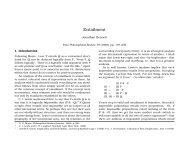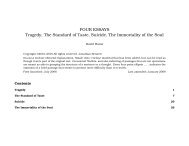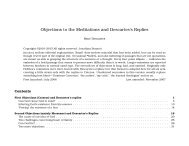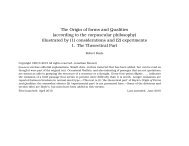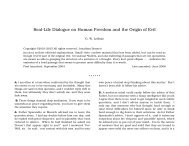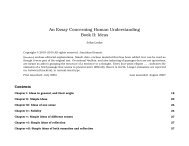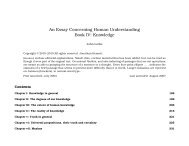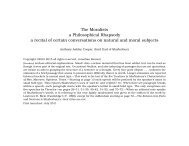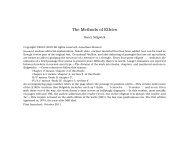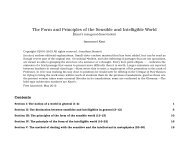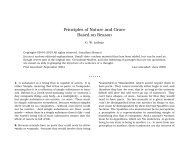A Vindication of the Rights of Woman with - Early Modern Texts
A Vindication of the Rights of Woman with - Early Modern Texts
A Vindication of the Rights of Woman with - Early Modern Texts
You also want an ePaper? Increase the reach of your titles
YUMPU automatically turns print PDFs into web optimized ePapers that Google loves.
The <strong>Rights</strong> <strong>of</strong> <strong>Woman</strong> Mary Wollstonecraft 4: The degradation <strong>of</strong> woman<br />
instead <strong>of</strong> <strong>the</strong> dimples <strong>of</strong> animal spirits, expecting to see<br />
individuality <strong>of</strong> character, which is <strong>the</strong> only thing that can<br />
fasten <strong>the</strong> affections. 6 We <strong>the</strong>n want to converse, not to<br />
fondle; to give scope to our imaginations as well as to <strong>the</strong><br />
sensations <strong>of</strong> our hearts.<br />
. . . .The French, who admit more mind into <strong>the</strong>ir notions<br />
<strong>of</strong> beauty, give <strong>the</strong> preference to women <strong>of</strong> thirty. This means<br />
that <strong>the</strong>y allow women to be in <strong>the</strong>ir most perfect state when<br />
vivacity gives way to reason and to <strong>the</strong> majestic seriousness<br />
<strong>of</strong> character which signifies maturity. . . . Between twenty<br />
and thirty <strong>the</strong> solid parts <strong>of</strong> <strong>the</strong> body become denser and <strong>the</strong><br />
flexible muscles grow more rigid, giving character to <strong>the</strong> face;<br />
i.e. <strong>the</strong>y trace <strong>the</strong> operations <strong>of</strong> <strong>the</strong> mind <strong>with</strong> <strong>the</strong> iron pen<br />
<strong>of</strong> fate, and tell us not only what powers <strong>the</strong> person has but<br />
how <strong>the</strong>y have been employed.<br />
Animals who arrive slowly at maturity are <strong>the</strong> longest<br />
lived, and <strong>of</strong> <strong>the</strong> noblest species. But men can’t claim any<br />
natural superiority from <strong>the</strong> grandeur <strong>of</strong> longevity, for in this<br />
respect nature has not distinguished <strong>the</strong> male.<br />
Polygamy is ano<strong>the</strong>r physical degradation, a custom that<br />
blasts every domestic virtue; and a plausible argument for<br />
it is drawn from <strong>the</strong> well-attested fact that in <strong>the</strong> countries<br />
where polygamy is established more females are born than<br />
males. [This was widely believed at MW’s time; it isn’t true.] Nature<br />
seems to be telling us something here, and apparently<br />
reasonable <strong>the</strong>ories must yield capitulate to nature. And<br />
a fur<strong>the</strong>r conclusion obviously presents itself: if polygamy<br />
is necessary, woman must be inferior to man, and made for<br />
him.<br />
We know very little about <strong>the</strong> formation <strong>of</strong> <strong>the</strong> foetus in <strong>the</strong><br />
womb, but it seems to me probable that an accidental physical<br />
cause may explain this phenomenon ·<strong>of</strong> <strong>the</strong> unbalanced<br />
6<br />
birth ratio·, proving it not to be a law <strong>of</strong> nature. [She quotes<br />
a writer who says that <strong>the</strong> birth ratio results from polygamy,<br />
not vice versa: it comes from <strong>the</strong> fact that in <strong>the</strong> countries<br />
in question ‘<strong>the</strong> men are enervated by <strong>the</strong> use <strong>of</strong> so many<br />
women’, and <strong>the</strong> women have a ‘hotter’ constitution partly<br />
because <strong>the</strong>y are aggrieved at not having <strong>the</strong>ir husbands to<br />
<strong>the</strong>mselves. ‘So <strong>the</strong> necessity <strong>of</strong> polygamy does not appear’,<br />
MW writes, and <strong>the</strong>n in mid-sentence she launches on a new<br />
aspect <strong>of</strong> <strong>the</strong> degradation <strong>of</strong> women, namely seduction.]<br />
When a man seduces a woman, I think this should be<br />
called ‘a left-handed marriage’, and <strong>the</strong> man should be<br />
legally obliged to support <strong>the</strong> woman and her children unless<br />
adultery—a natural divorce—cancels <strong>the</strong> obligation. And this<br />
law should remain in force for as long as women’s weakness<br />
causes <strong>the</strong> word ‘seduction’ to be used as an excuse for<br />
<strong>the</strong>ir frailty and lack <strong>of</strong> principle—indeed, for as long as<br />
<strong>the</strong>y depend on man for subsistence, instead <strong>of</strong> earning it<br />
by <strong>the</strong> use <strong>of</strong> <strong>the</strong>ir own hands or heads. But <strong>the</strong>se women<br />
shouldn’t be called ‘wives’ in <strong>the</strong> full sense <strong>of</strong> that word;<br />
o<strong>the</strong>rwise <strong>the</strong> very purpose <strong>of</strong> marriage will be subverted,<br />
and all those endearing charities that flow from personal<br />
fidelity would melt into selfishness. [MW builds into that sentence<br />
that <strong>the</strong> ‘endearing charities’ in question ‘give <strong>the</strong> marriage tie a sanctity<br />
even where <strong>the</strong>re is nei<strong>the</strong>r love nor friendship between <strong>the</strong> parties’.] A<br />
woman who is faithful to <strong>the</strong> fa<strong>the</strong>r <strong>of</strong> her children demands<br />
respect, and shouldn’t be treated like a prostitute; though<br />
I readily grant that if it is necessary for a man and woman<br />
to live toge<strong>the</strong>r in order to bring up <strong>the</strong>ir <strong>of</strong>fspring, nature<br />
never intended any man to have more than one wife.<br />
Still, highly as I respect marriage as <strong>the</strong> foundation <strong>of</strong><br />
almost every social virtue, I can’t help feeling <strong>the</strong> most lively<br />
compassion for <strong>the</strong> unfortunate females who are broken <strong>of</strong>f<br />
The strength <strong>of</strong> an affection is generally proportional to <strong>the</strong> extent to which, in <strong>the</strong> beloved object, <strong>the</strong> character <strong>of</strong> <strong>the</strong> •species is lost in <strong>the</strong> character<br />
<strong>of</strong> <strong>the</strong> •individual.<br />
48



